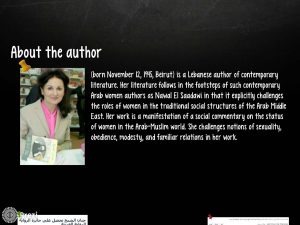The Middle East Studies Association (MESA) brings together scholars, educators and all those who are interested in studies (language, literature, culture, politics, etc.) related to that area of the world from all over the world. It holds a yearly meeting in the capital city, with a wide range of activities: presentation of research papers, workshops, panels, book bazaars and film festival are held in the span of five days.
This year, I had the pleasure of participating with a presentation under the title “Literature: The First Step to Awareness that Leads to Rebellion.” This presentation revolves around the award winning novel ( The Locust and The Bird by Hanan Al-Shayhk) that I teach for the advanced class of Arabic Prose Narrative. As an interdisciplinary class, I used strategies of contextualization, conceptualization and problem solving in teaching this class. Working towards language accuracy, proficiency and appropriateness was couples with tasks that required the students to link their analysis and discussions to the context of the novel (contemporary Arab counties), bearing in mind the meaning as well as the significance of relevant concepts at that time and place. Such concepts include “women rights”, “human rights”, “laws” (especially those pertaining to marriage and family matters),”education”, “the status of Art in the society”, “views of the working women”, “the role of family and family ties in society”,and others.
Towards the end of the semester, students were asked to search in the current issues of the Arab world and find out the reasons that lead the people in various Arab counties to revolt in the events of what was latter called the Arab Spring. Students were instructed to find out the types of changes people were demanding. They were then asked to investigate as to what steps were actually taken in different Arab counties that had the Arab Spring towards gaining these demands. Finally they were asked to view these current issues in the light of the novel and the protagonist in her personal journey of revolution. An essay written in accurate, proficient and appropriate Modern standard Arabic, coupled with a presentation (summary and findings of the essay) was treated as a one form of assessment towards the end of that course. My presentation in MESA was summary of the course findings in that class.
I also had the pleasure of attending a number of presentations held in this annual meeting that revolved around the theme of teaching Arabic On-Line. The sessions were quite informative and inspiring, and I hope to use what I learned in teaching Arabic here at Yale.
